
Related
Guests
- Iona Craigjournalist who was based in Sana’a for four years as the Yemen correspondent for The Times of London. She was awarded the Martha Gellhorn Prize for Journalism in 2014. She left Yemen last month and joins us now from London.
Yemen is facing political collapse following the mass resignations of President Abdu Rabbu Mansour Hadi, his prime minister and entire cabinet. Thursday’s exodus came just hours after Shia Houthi rebels stormed the presidential compound in the capital city of Sana’a. Hadi said he could not continue in office after Houthis allegedly broke a peace deal to retreat from key positions in return for increased political power. The Houthis appear to have major backing from longtime former president Ali Abdullah Saleh, who was ousted in a popular uprising in 2011. The Obama administration had praised the Yemeni government as being a model for “successful” counterterrorism partnerships, but on Thursday the United States announced it was pulling more staff out of its embassy in Yemen. Some experts warn the developments in Yemen could result in civil war and help al-Qaeda in the Arabian Peninsula (AQAP) gain more power. Meanwhile, Oxfam is warning more than half of Yemen’s population needs aid, and a humanitarian crisis of extreme proportions is at risk of unfolding in the country if instability continues. We are joined by Iona Craig, a journalist who was based in Sana’a for four years as the Yemen correspondent for The Times of London.
Transcript
JUAN GONZÁLEZ: We begin in Yemen, which is teetering on the brink of collapse after the U.S.-backed president, Abdu Rabbu Mansour Hadi, his prime minister and entire cabinet resigned on Thursday. The exodus came just 24 hours after Shia Houthi rebels stormed the presidential compound in the capital city of Sana’a. Hadi said he could not continue ruling after Houthis allegedly broke a peace deal to retreat from key positions in return for increased political power. The Houthis appear to have major backing from longtime president Ali Abdullah Saleh, the ousted leader who was forced from office in a popular uprising in 2011.
AMY GOODMAN: The Obama administration had praised the Yemeni government as being a model for “successful” counterterrorism partnerships, but on Thursday the U.S. announced it was pulling more staff out of its embassy in Yemen. Some experts warn the developments in Yemen could result in civil war and help al-Qaeda in the Arabian Peninsula gain more power. Meanwhile, Oxfam is warning more than half of Yemen’s population needs aid, and a humanitarian crisis of extreme proportions is at risk of unfolding in the country if instability continues. Ten million Yemenis do not have enough to eat, including 850,000 acutely malnourished children.
For more, we go to London, where we’re joined by Iona Craig. She’s a journalist who was based in Sana’a, Yemen, for four years as the Yemen correspondent for The Times of London, was awarded the Martha Gellhorn Prize for Journalism in 2014.
Iona, welcome back to Democracy Now! Talk about what has taken place.
IONA CRAIG: I think what we’ve seen in the last few days is pretty unprecedented in terms of Yemen, and I think what’s happened now with Hadi handing in his resignation, the prime minister and the cabinet, is really probably the smartest thing they could have done. They were backed into a corner by the Houthis, and quite literally, the Houthis had surrounded Hadi’s house. They obviously couldn’t and hadn’t taken them on militarily, in a fight that they were unlikely to be able to win. And so this was the only way for them to turn around to the Houthis and say, “No, this is enough.”
And now we have the prospect of an emergency meeting of the Parliament on Sunday, when Hadi’s resignation will be put forward. Now, they have the option to reject that resignation, which means that Hadi would still be president after that, unless he then hands his resignation in again within three months. So it may actually be that Hadi stays and manages to survive all of this.
JUAN GONZÁLEZ: And, Iona, given the constant turbulence within the country, what’s the impact on some of the regional powers—obviously, Iran and the United States and Saudi Arabia?
IONA CRAIG: Well, really, you know, the reason why the international community has been promoting and supporting Hadi is because, for them, there wasn’t another option. They’ve been backing this transition deal from the beginning. It was created initially as Ali Abdullah Saleh signed the deal at the end of 2011 in order to step down, this deal called the GCC deal. But it really originated—and it’s an open secret in Sana’a—from the American Embassy. And the reason we know that is that the politicians in Yemen that first saw it could tell that it was translated from English. So, that transition deal is what the international community have been backing. And that transition deal is really what has brought this to this place today, because it never truly addressed the underlying problems in Yemen. It was all about reshuffling power in order to concentrate on the security issues within Yemen, without actually making the changes that Yemenis have been demanding. So, issues like the Houthis, who were a marginalized group and persecuted under Ali Abdullah Saleh, the issue of southern secession, they were never truly addressed throughout this period. And now this has come to a head now with the Houthis taking their own action to get what they want. So the international community is partly responsible for the situation that Yemen is now in. But, of course, their focus still remains on the security issues in Yemen.
AMY GOODMAN: I want to turn to comments President Obama made last summer when he announced additional U.S. military support to fight the Islamic State in Iraq and Syria. In response to a question, President Obama invoked U.S. policy in Yemen as a possible model for Iraq and Syria. This is part of what he said.
PRESIDENT BARACK OBAMA: You look at a country like Yemen, a very impoverished country and one that has its own sectarian or ethnic divisions, there’s—we do have a committed partner in President Hadi and his government, and we have been able to help to develop their capacities without putting large numbers of U.S. troops on the ground, at the same time as we’ve got enough CT, or counterterrorism, capabilities that we’re able to go after folks that might try to hit our embassy or might be trying to export terrorism into Europe or the United States.
AMY GOODMAN: That was President Obama over the summer. Your response, Iona Craig?
IONA CRAIG: Well, I think this really kind of goes back to what I just mentioned. The international focus has always been about security in Yemen. So, even when Ali Abdullah Saleh was in power, they backed him because they could work with him and, you know, to carry out the operations that they wanted, to use drone strikes in Yemen. And there was no plan B. There was no “What will we do if Ali Abdullah Saleh is not there?” And similarly, then, with Hadi. They knew Hadi had been vice president under Ali Abdullah Saleh. It was someone they knew they could work with. They built on the partnership. And again, now, there is—there is no plan B. So if Hadi goes, this leaves them in a position—you know, in a really bad position of who now are they dealing with.
As for the issue of the Yemen model, clearly now that’s something of a joke, really. The Yemen model has all but collapsed. The fighting against al-Qaeda on the ground has actually been done now by the Houthis, but it’s actually made the issue and the problem of al-Qaeda worse in Yemen, anyway. The violence being carried out by al-Qaeda has increased hugely since the Houthis took Sana’a in September. But, you know—and again, looking at those Oxfam figures, the underlying problems in Yemen, you have—now those figures have gone to 16 million people in need of humanitarian aid. The last figures that came out said 14.7 million, out of a population of 25. So, whilst the international community focuses on the security issues, you’ve got an economy that’s collapsing, you’ve got a rising humanitarian crisis and political issues that haven’t been dealt with. So, this kind of short-term thinking about the security situation in Yemen is really never going to get to the bottom of the political problems, the economic problems and the humanitarian issues that all feed into this in the end.
JUAN GONZÁLEZ: And you mentioned one of the other underlying problems being an ongoing secessionist movement. Most Americans here have short memories. They forget that it wasn’t long ago when there was a separate Marxist state, the Democratic Republic of Yemen, in a huge portion of what is now Yemen. Could you talk about that secessionist movement in its current form?
IONA CRAIG: Yes, the Southern Movement, or al-Hirak al-Janoubi, as it’s known in Yemen, has been around for many years now, technically since 2007. But North and South Yemen, we unified in 1990, and then there was a brief civil war in 1994, and the south was very much crushed in that. But this call for secession has been increasing rapidly over the last few years, particularly obviously since 2011. But the international community again has failed to really engage with the southerners. And they particularly reached out to the U.K., actually, because obviously the British previously had control of Aden, the southern city, for many years. And they reached out to the international community. And really, the international community didn’t—hasn’t engaged with them, mainly because they feel that if they engage with the south, then it’s recognizing their calls for secession, and they don’t want Yemen to break up, because they think it will impact the security situation. So, in that void, it’s actually Iran that a lot of the time in the south has stepped in and has engaged with the southerners, because nobody else will. And they have increasingly been engaging with them and supporting them.
But we’ve also got a situation now in the south over the last 24 hours, since everything’s happened in Sana’a, where they are now taking action. There have been big protests in the south today. They have said—you know, put out a message saying they will refuse to take orders now from Sana’a because of what’s happening with the Houthis. And it now appears that the Houthis are in charge. But, you know, there’s a lot of politicking going on in Aden right now. So you’ve got President Hadi with his supporters and his militiamen and gunmen on the streets. You’ve also got the Houthis, supported by Ali Abdullah Saleh, been trying to make gains in Aden, as well. So, it’s going to come to a head in the south, and that looks like it’s going to happen sooner rather than later now, because of what’s happening in Sana’a.
AMY GOODMAN: Will Saleh return as president?
IONA CRAIG: Ali Abdullah Saleh?
AMY GOODMAN: Yes.
IONA CRAIG: I think that’s very unlikely, but I think the chances of Ahmed Ali, his son, returning as president are possible. I think that’s distinctly possible. It may not happen in the next week, but when it comes the time of presidential elections—goodness knows when that will happen now—but I think there is a possibility that Ahmed Ali, his son, could rule Yemen. And right now, you know, for some Yemenis, they would throw up their hands and say, you know, security, some form of stability, some form of governance is better than nothing. They’re in a pretty dire situation right now with an economy that’s collapsing and this humanitarian crisis going on at the same time. And people most of the time just want stability so they can carry on with their lives.
AMY GOODMAN: Iona Craig, we want to thank you very much for being with us. She’s speaking to us from London, but she lived for four years in Sana’a, in the capital of Yemen, reporting for The Times of London, winner of the Martha Gellhorn Prize for Journalism.


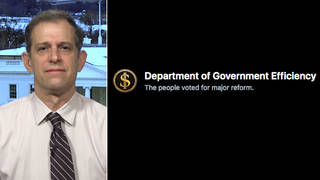
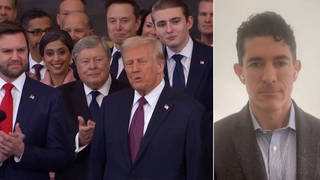
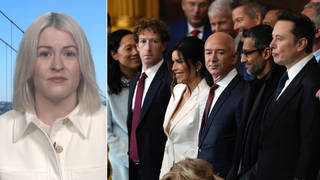





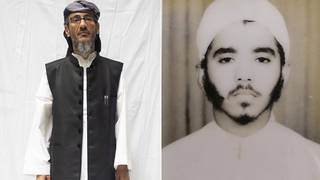
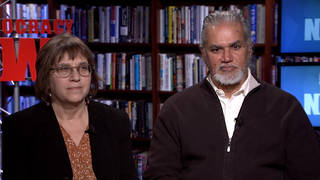
Media Options